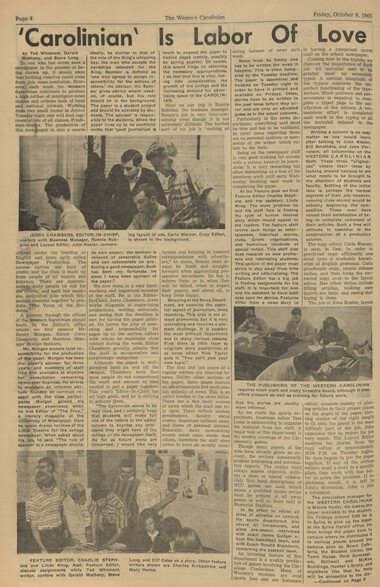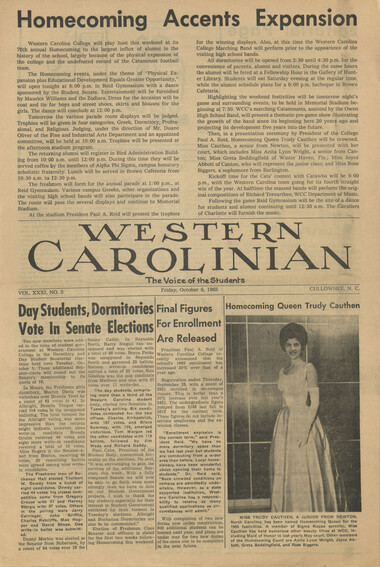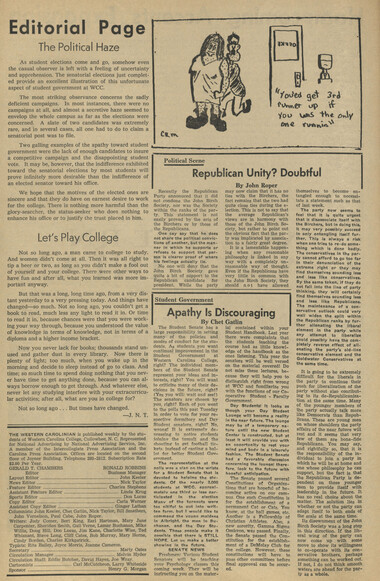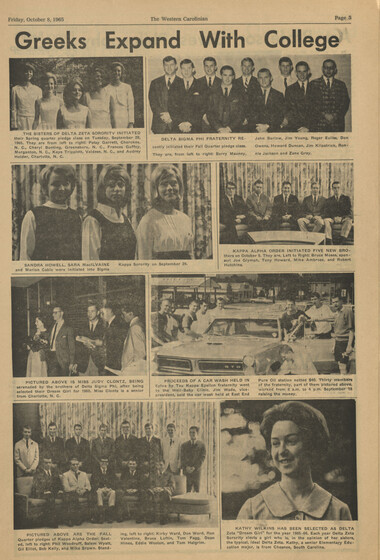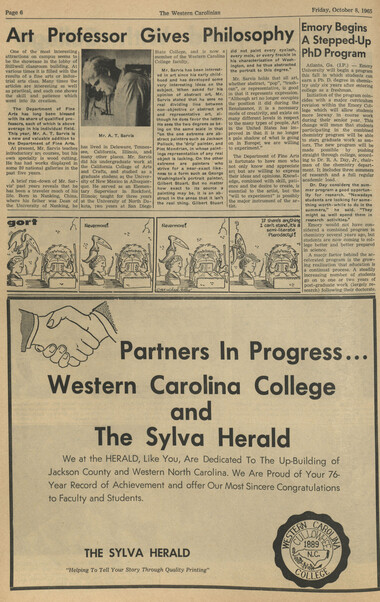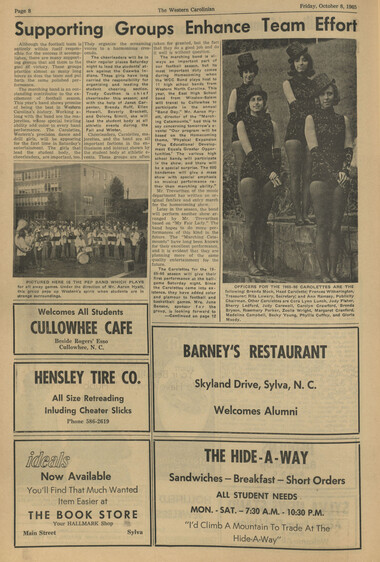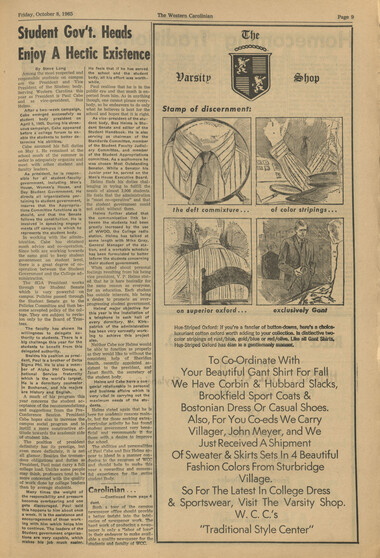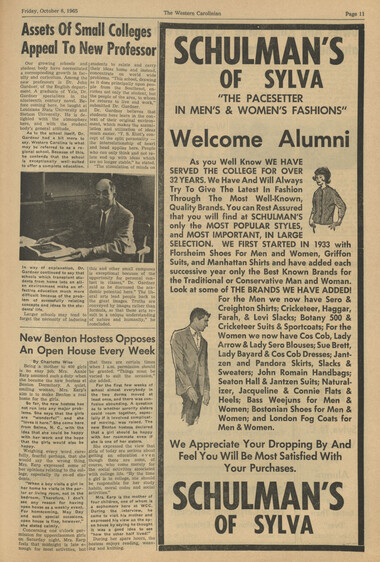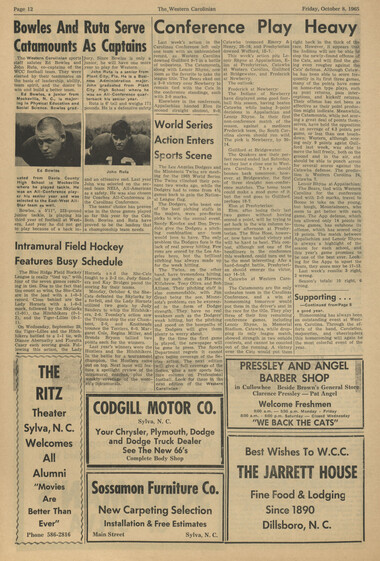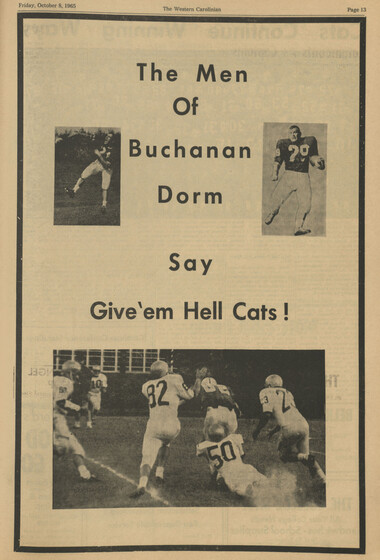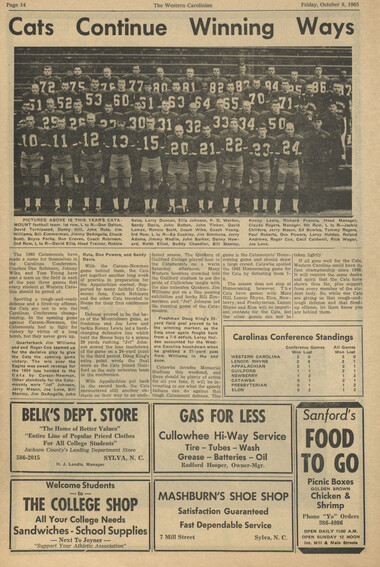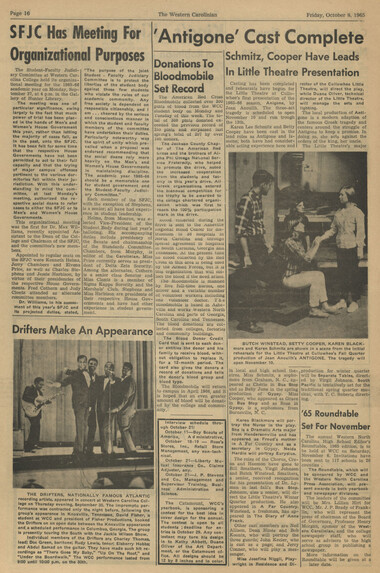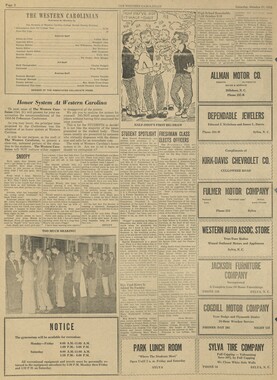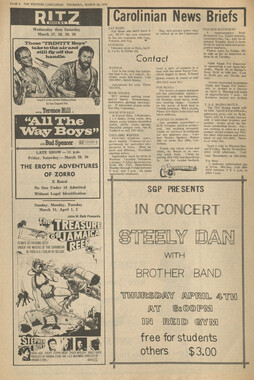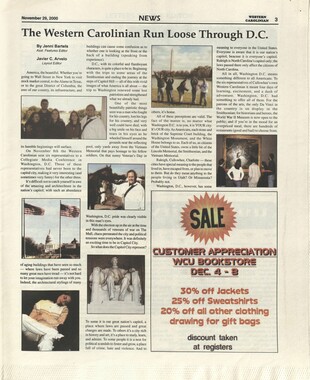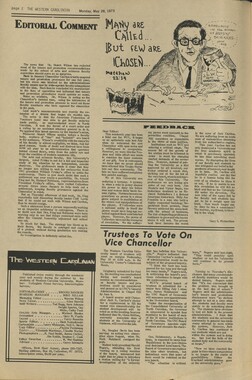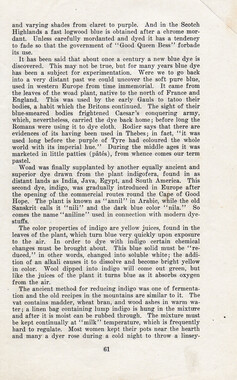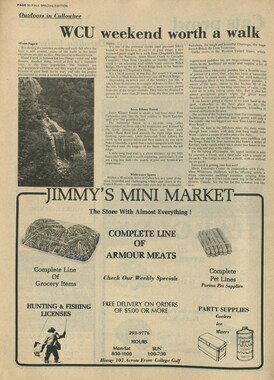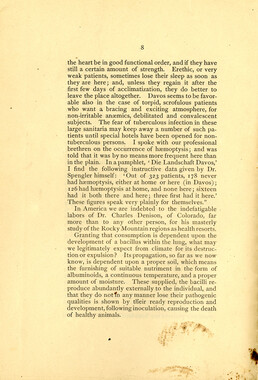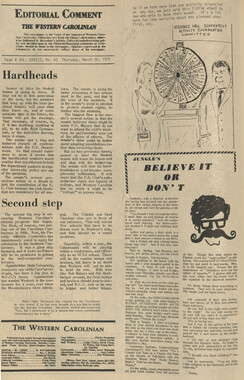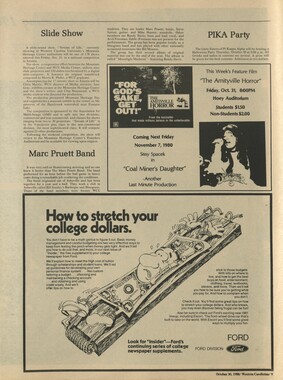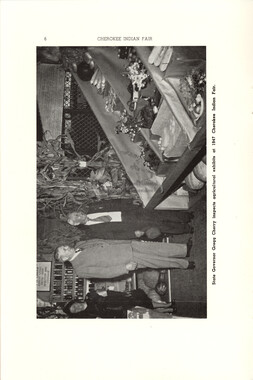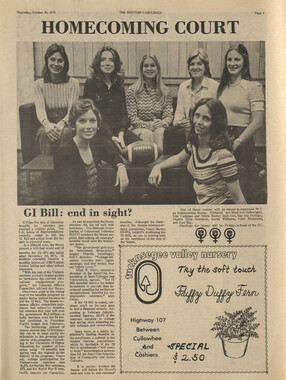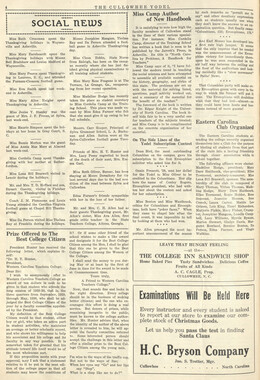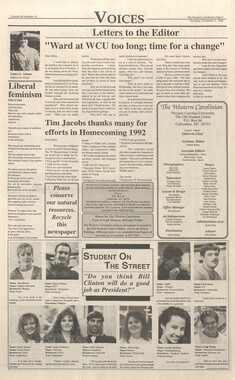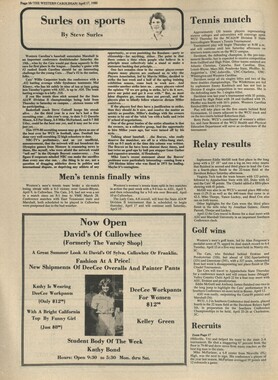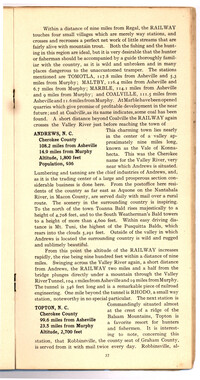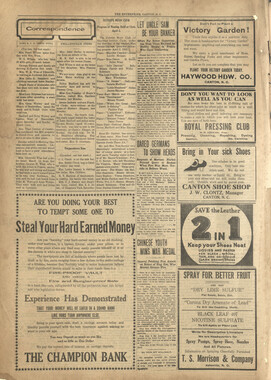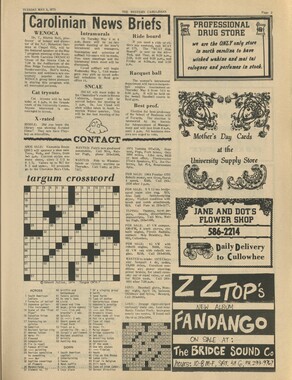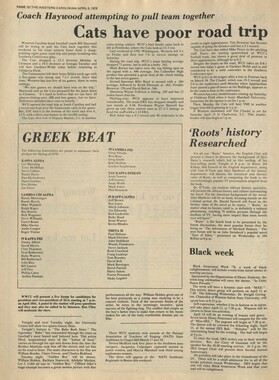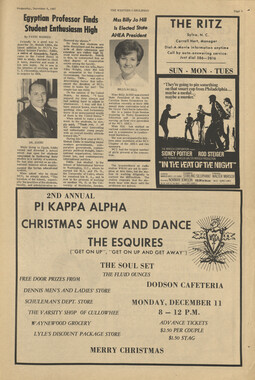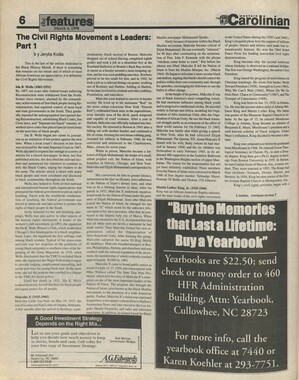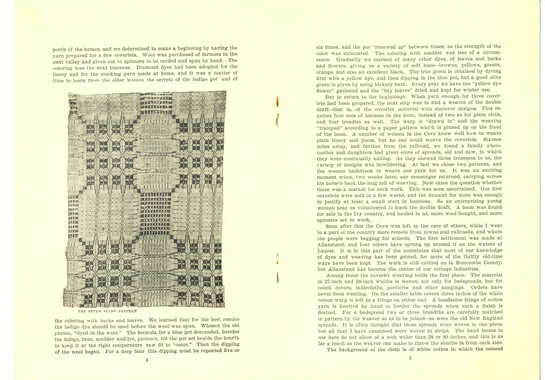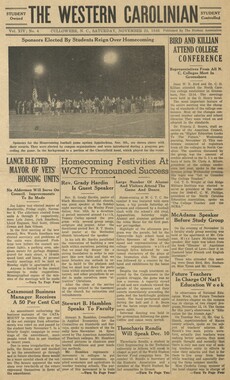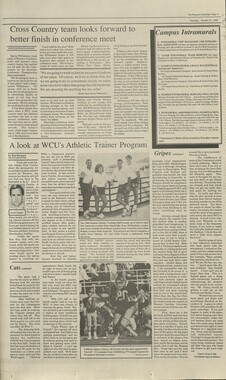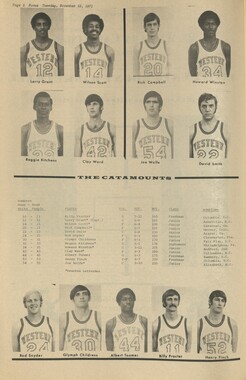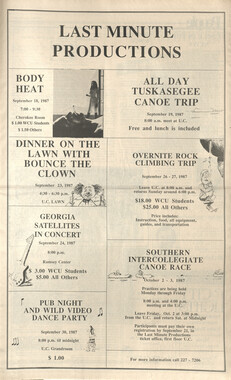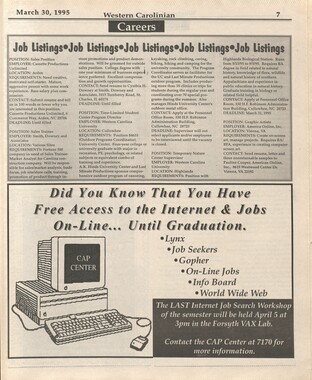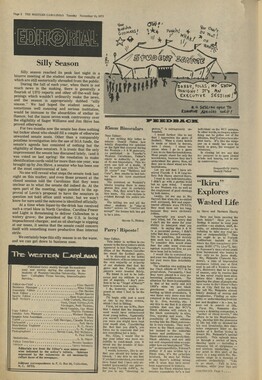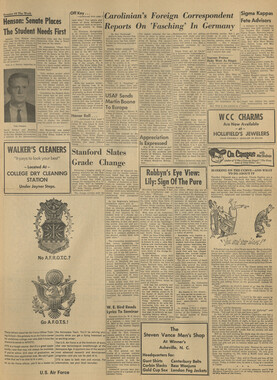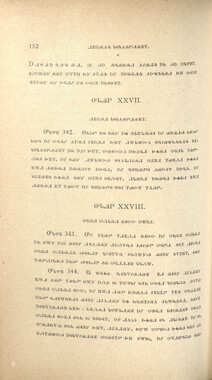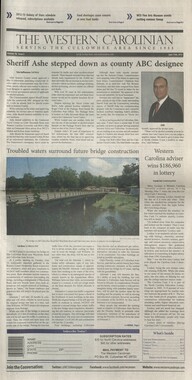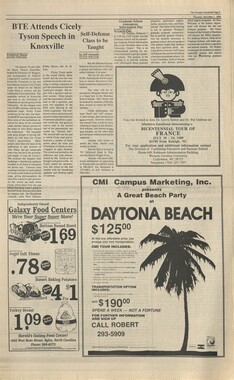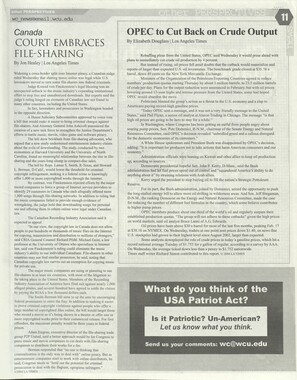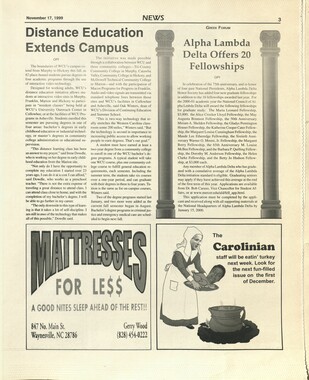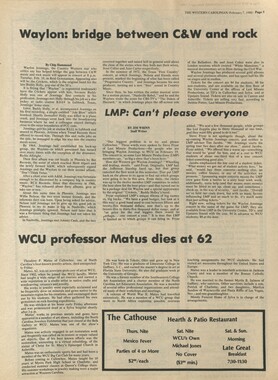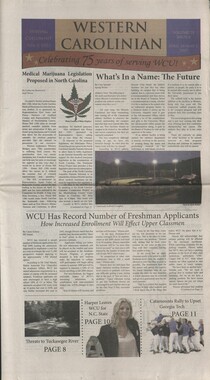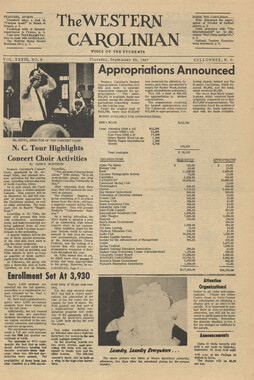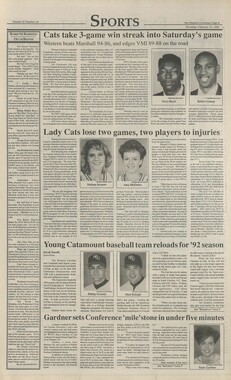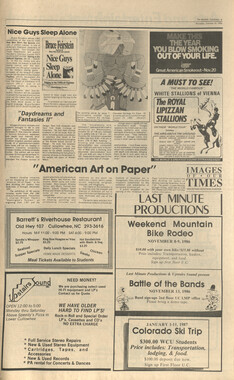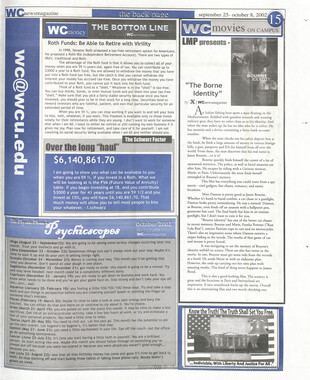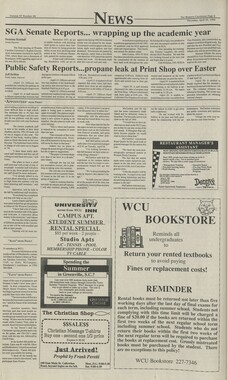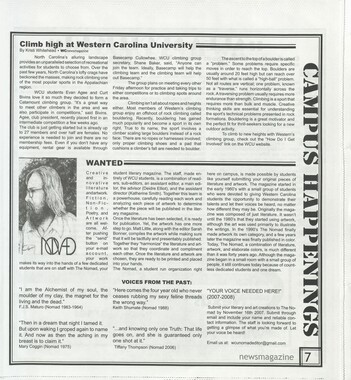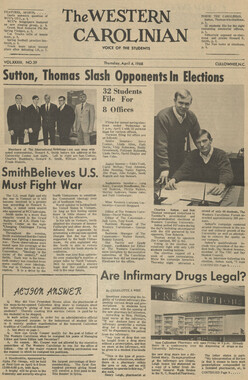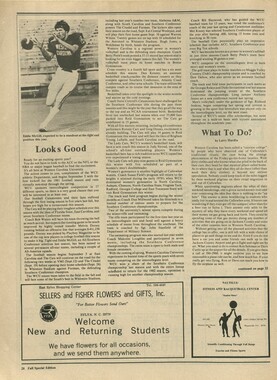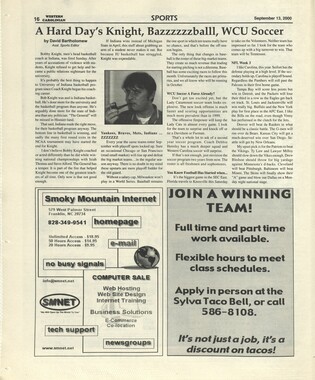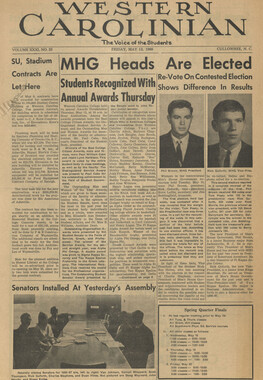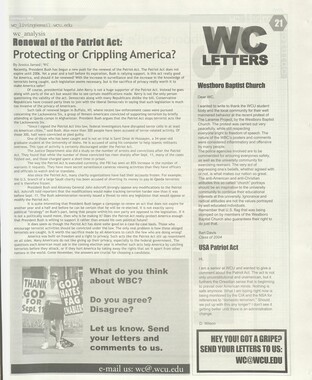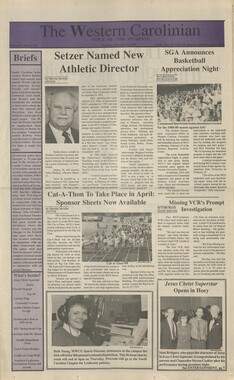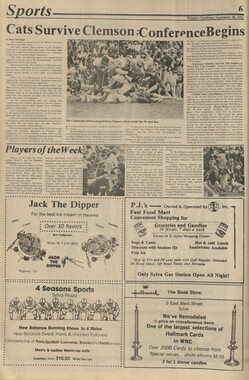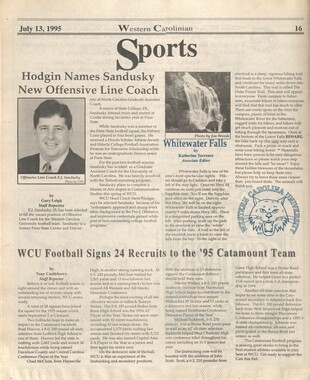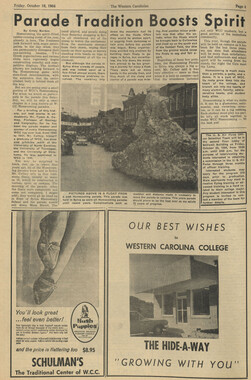Western Carolina University (21)
View all
- Canton Champion Fibre Company (2308)
- Cherokee Traditions (291)
- Civil War in Southern Appalachia (165)
- Craft Revival (1942)
- George Masa Collection (137)
- Great Smoky Mountains - A Park for America (3080)
- Highlights from Western Carolina University (422)
- Horace Kephart (998)
- Journeys Through Jackson (159)
- LGBTQIA+ Archive of Jackson County (90)
- Oral Histories of Western North Carolina (318)
- Picturing Appalachia (6617)
- Stories of Mountain Folk (413)
- Travel Western North Carolina (153)
- Western Carolina University Fine Art Museum Vitreograph Collection (129)
- Western Carolina University Herbarium (92)
- Western Carolina University: Making Memories (738)
- Western Carolina University Publications (2491)
- Western Carolina University Restricted Electronic Theses and Dissertations (146)
- Western North Carolina Regional Maps (71)
- World War II in Southern Appalachia (131)
University of North Carolina Asheville (6)
View all
- Allanstand Cottage Industries (62)
- Appalachian National Park Association (53)
- Bennett, Kelly, 1890-1974 (1463)
- Berry, Walter (76)
- Brasstown Carvers (40)
- Carver, George Washington, 1864?-1943 (26)
- Cathey, Joseph, 1803-1874 (1)
- Champion Fibre Company (233)
- Champion Paper and Fibre Company (297)
- Cherokee Indian Fair Association (16)
- Cherokee Language Program (22)
- Crowe, Amanda (40)
- Edmonston, Thomas Benton, 1842-1907 (7)
- Ensley, A. L. (Abraham Lincoln), 1865-1948 (275)
- Fromer, Irving Rhodes, 1913-1994 (70)
- George Butz (BFS 1907) (46)
- Goodrich, Frances Louisa (120)
- Grant, George Alexander, 1891-1964 (96)
- Heard, Marian Gladys (60)
- Kephart, Calvin, 1883-1969 (15)
- Kephart, Horace, 1862-1931 (313)
- Kephart, Laura, 1862-1954 (91)
- Laney, Gideon Thomas, 1889-1976 (439)
- Masa, George, 1881-1933 (61)
- McElhinney, William Julian, 1896-1953 (44)
- Niggli, Josephina, 1910-1983 (10)
- North Carolina Park Commission (105)
- Osborne, Kezia Stradley (9)
- Owens, Samuel Robert, 1918-1995 (11)
- Penland Weavers and Potters (36)
- Roberts, Vivienne (15)
- Roth, Albert, 1890-1974 (142)
- Schenck, Carl Alwin, 1868-1955 (1)
- Sherrill's Photography Studio (2565)
- Southern Highland Handicraft Guild (127)
- Southern Highlanders, Inc. (71)
- Stalcup, Jesse Bryson (46)
- Stearns, I. K. (213)
- Thompson, James Edward, 1880-1976 (226)
- United States. Indian Arts and Crafts Board (130)
- USFS (683)
- Vance, Zebulon Baird, 1830-1894 (1)
- Weaver, Zebulon, 1872-1948 (58)
- Western Carolina College (230)
- Western Carolina Teachers College (282)
- Western Carolina University (2008)
- Western Carolina University. Mountain Heritage Center (18)
- Whitman, Walt, 1819-1892 (10)
- Wilburn, Hiram Coleman, 1880-1967 (73)
- Williams, Isadora (3)
- Cain, Doreyl Ammons (0)
- Crittenden, Lorraine (0)
- Rhodes, Judy (0)
- Smith, Edward Clark (0)
- Appalachian Region, Southern (3032)
- Asheville (N.C.) (1945)
- Avery County (N.C.) (26)
- Blount County (Tenn.) (195)
- Buncombe County (N.C.) (1680)
- Cherokee County (N.C.) (283)
- Clay County (N.C.) (556)
- Graham County (N.C.) (238)
- Great Smoky Mountains National Park (N.C. and Tenn.) (535)
- Haywood County (N.C.) (3573)
- Henderson County (N.C.) (70)
- Jackson County (N.C.) (4926)
- Knox County (Tenn.) (35)
- Knoxville (Tenn.) (13)
- Lake Santeetlah (N.C.) (10)
- Macon County (N.C.) (421)
- Madison County (N.C.) (216)
- McDowell County (N.C.) (39)
- Mitchell County (N.C.) (135)
- Polk County (N.C.) (35)
- Qualla Boundary (982)
- Rutherford County (N.C.) (78)
- Swain County (N.C.) (2185)
- Transylvania County (N.C.) (270)
- Watauga County (N.C.) (12)
- Waynesville (N.C.) (86)
- Yancey County (N.C.) (72)
- Aerial Photographs (3)
- Aerial Views (60)
- Albums (books) (4)
- Articles (1)
- Artifacts (object Genre) (228)
- Bibliographies (1)
- Biography (general Genre) (2)
- Cards (information Artifacts) (38)
- Clippings (information Artifacts) (193)
- Copybooks (instructional Materials) (3)
- Crafts (art Genres) (622)
- Depictions (visual Works) (21)
- Design Drawings (1)
- Digital Moving Image Formats (2)
- Drawings (visual Works) (185)
- Envelopes (115)
- Exhibitions (events) (1)
- Facsimiles (reproductions) (1)
- Fiction (general Genre) (4)
- Financial Records (12)
- Fliers (printed Matter) (67)
- Glass Plate Negatives (381)
- Guidebooks (2)
- Internegatives (10)
- Interviews (823)
- Land Surveys (102)
- Letters (correspondence) (1070)
- Manuscripts (documents) (618)
- Maps (documents) (177)
- Memorandums (25)
- Minutes (administrative Records) (59)
- Negatives (photographs) (6090)
- Newsletters (1290)
- Newspapers (2)
- Notebooks (8)
- Occupation Currency (1)
- Paintings (visual Works) (1)
- Pen And Ink Drawings (1)
- Periodicals (194)
- Personal Narratives (10)
- Photographs (12977)
- Plans (maps) (1)
- Poetry (6)
- Portraits (4568)
- Postcards (329)
- Programs (documents) (181)
- Publications (documents) (2444)
- Questionnaires (65)
- Relief Prints (26)
- Sayings (literary Genre) (1)
- Scrapbooks (282)
- Sheet Music (2)
- Slides (photographs) (402)
- Songs (musical Compositions) (2)
- Sound Recordings (802)
- Specimens (92)
- Speeches (documents) (18)
- Tintypes (photographs) (8)
- Transcripts (329)
- Text Messages (0)
- A.L. Ensley Collection (275)
- Appalachian Industrial School Records (7)
- Appalachian National Park Association Records (336)
- Axley-Meroney Collection (2)
- Bayard Wootten Photograph Collection (20)
- Bethel Rural Community Organization Collection (7)
- Blumer Collection (5)
- C.W. Slagle Collection (20)
- Canton Area Historical Museum (2110)
- Carlos C. Campbell Collection (462)
- Cataloochee History Project (64)
- Cherokee Studies Collection (4)
- Daisy Dame Photograph Album (5)
- Daniel Boone VI Collection (1)
- Doris Ulmann Photograph Collection (112)
- Elizabeth H. Lasley Collection (1)
- Elizabeth Woolworth Szold Fleharty Collection (4)
- Frank Fry Collection (95)
- George Masa Collection (173)
- Gideon Laney Collection (452)
- Hazel Scarborough Collection (2)
- Hiram C. Wilburn Papers (28)
- Historic Photographs Collection (236)
- Horace Kephart Collection (861)
- Humbard Collection (33)
- Hunter and Weaver Families Collection (1)
- I. D. Blumenthal Collection (4)
- Isadora Williams Collection (4)
- Jesse Bryson Stalcup Collection (47)
- Jim Thompson Collection (224)
- John B. Battle Collection (7)
- John C. Campbell Folk School Records (80)
- John Parris Collection (6)
- Judaculla Rock project (2)
- Kelly Bennett Collection (1482)
- Love Family Papers (11)
- Major Wiley Parris Civil War Letters (3)
- Map Collection (12)
- McFee-Misemer Civil War Letters (34)
- Mountain Heritage Center Collection (4)
- Norburn - Robertson - Thomson Families Collection (44)
- Pauline Hood Collection (7)
- Pre-Guild Collection (2)
- Qualla Arts and Crafts Mutual Collection (12)
- R.A. Romanes Collection (681)
- Rosser H. Taylor Collection (1)
- Samuel Robert Owens Collection (94)
- Sara Madison Collection (144)
- Sherrill Studio Photo Collection (2558)
- Smoky Mountains Hiking Club Collection (616)
- Stories of Mountain Folk - Radio Programs (374)
- The Reporter, Western Carolina University (510)
- Venoy and Elizabeth Reed Collection (16)
- WCU Gender and Sexuality Oral History Project (36)
- WCU Mountain Heritage Center Oral Histories (25)
- WCU Oral History Collection - Mountain People, Mountain Lives (71)
- WCU Students Newspapers Collection (1923)
- Western North Carolina Tomorrow Black Oral History Project (69)
- William Williams Stringfield Collection (2)
- Zebulon Weaver Collection (109)
- African Americans (390)
- Appalachian Trail (35)
- Artisans (521)
- Cherokee art (84)
- Cherokee artists -- North Carolina (10)
- Cherokee language (21)
- Cherokee pottery (101)
- Cherokee women (208)
- Church buildings (190)
- Civilian Conservation Corps (U.S.) (111)
- College student newspapers and periodicals (2012)
- Dams (108)
- Dance (1023)
- Education (222)
- Floods (63)
- Folk music (1015)
- Forced removal, 1813-1903 (2)
- Forest conservation (220)
- Forests and forestry (1198)
- Gender nonconformity (4)
- Great Smoky Mountains National Park (N.C. and Tenn.) (181)
- Hunting (47)
- Landscape photography (25)
- Logging (122)
- Maps (83)
- Mines and mineral resources (9)
- North Carolina -- Maps (18)
- Paper industry (38)
- Postcards (255)
- Pottery (135)
- Railroad trains (72)
- Rural electrification -- North Carolina, Western (3)
- School integration -- Southern States (2)
- Segregation -- North Carolina, Western (5)
- Slavery (5)
- Sports (452)
- Storytelling (243)
- Waterfalls -- Great Smoky Mountains (N.C. and Tenn.) (66)
- Weaving -- Appalachian Region, Southern (280)
- Wood-carving -- Appalachian Region, Southern (328)
- World War, 1939-1945 (174)
Western Carolinian Volume 31 Number 05
Item
Item’s are ‘child’ level descriptions to ‘parent’ objects, (e.g. one page of a whole book).
-
-
Page 4 The Western Carolinian Friday, October 8, 1965 'Carolinian' Is Labor Of Love by Ted Whisnant, Gerald Matheny, and Steve Long To one who has never seen a newspaper in the process of being drawn up, it would seem that nothing creative could come from this mass confusion. However, each week the Western Carolinian continues to produce a high caliber of intelligent news stories and articles both of local and national interest. Working from two small rooms in Joyner Tuesday night one will find representatives of all classes, Fresh- men-Senlbr. The production of this newspaper is also a course ideally, be simitar to that of the role of the King's whipping boy, the man who accepts the hardships intended for the King. Sponsor is defined as 'one who agrees to accept responsibility for the actions of others.' As advisor, the Sponsor gives advice where needed, of course, but his role should be in the background. The paper is a student project and should be operated by students. The sponsor is responsible to the students. When the paper lives up to its unofficial motto that 'good Journalism is much to expand the paper to twelve pages weekly, possibly by spring quarter. Of course, this would hinge on obtaining the necessary appropriations. I do feel that this is vital, taking into consideration the growth of the college and the increasing demand for advertising space In the CAROLINIAN. Next on our trip is Ronnie Robbins, the business manager. Ronnie's job is very time-consuming even though it is not extremely difficult. The hardest part of his job is "making ad JERRY CHAMBERS, EDITOR-IN-CHIEF, confers with Business Manager, Ronnie Robbins and Layout Editor, John Keeler, concern ing layout of ads. Carla Warner, Copy Editor, is shown in the background. offered under the heading of English and more aptly called Newspaper Production. The course carries one hour of credit, and the class is made up from people of all majors and interests. There are approximately forty people on roll for the" course, and each has separate, individual jobs which ultimately combine together to produce £The Voice of the Students." A journey through the offices of the Western Carolinian should begin in the Editor's office where we find sponsor Mr. Henry Morgan, Editor Jerry Chambers, and Business Manager Ronnie Robbins. Mr. Morgan accepts total responsibility for the production of the paper. Morgan has been the paper's sponsor for three years, and members of staff find him available at anytime for consultation concerning newspaper business. He strives to maintain an informal attitude founded on common respect with the class participants Morgan gained his newspaper experience when he was Editor of "Ths Crux," a literary magazine at the University of Mississippi. Here he wrote drama reviews of the Little Theatre for the college newspaper. When asked about his job, he said, "The role of sponsor to a newspaper should, | its own censor," the sponsor is relieved of censorship duties and can concentrate on producing a good newspaper. Such has been my fortunate lot since I have been sponsor of the paper." We now come to a very hardworking and important member of the staff. He is the Editor- in-Chief, Jerry Chambers. Jerry works diligently at supervising productions, writing editorials, and seeing that the deadline is met for having the paper printed. He leaves the jobs of censoring and responsibility for pages up to the section editors with whom he maintains close contact during the week. Editor Chambers proudly admits that the staff is Go-operative and surprisingly competent. Although the paper is well- accepted both on and off the campus, Chambers feels that most people do not comprehend the work and amount of time needed to put a paper together. This year's Editor-in-Chief has set high goals, and he is striving to achieve them. "The Carolinian seems to be well read, and I certainly hope that students will make full use of the letters to the editor column to express any criticisms they might have of the college or the newspaper itself. As for as future plans are concerned, I would like very layouts and keeping in constant correspondence with advertisers," he states. Ronnie must always be frank and straightforward when approaching prospective advertisers. He has to inform them as to when they will be billed, when to expect their papers, and above all, to keep them happy. Stopping at the News Department, we examine the essential aspect of journalism, news reporting. This area is not always glamorous, but it is very interesting and involves a constant challenge. It is possibly the most difficult department due to many various reasons. First there is little room to originate story possibilities or as news editor Nick Taylor puts it, "You can't pick your own topic." The first and last pages of a regular edition are reserved for news. Unlike other sections of the paper, these pages contain no advertisements but must consist entirely of news. This is an added burden to the news editor. There are a few basic sources of news which the staff can rely upon. These include student government, faculty, social events, important national news, and items of personal interest! Naturally, more newsworthy events occur some weeks than others, therefore the staff must strive to have an equally intpr- FEATURE EDITOR, CHARLIE STEPH- ens and Linda Krug, Asst. Feature Editor, discuss assignments while Ted Whisnant, writer, confers with Gerald Matheny, Steve Long, and Clif Cates on a story. Other feature writers shown are Charles Kirkpatrick and Mary Home. esting balance or news each week. News must be timely and has to be written the week it happens. This is often hampered by the Tuesday deadline. The paper is assembled and finished on Tuesday night in order to have it printed and available on Fridays. Often, stories have to be written in the past tense before they occur and are only an educated guess as to the actual outcome. Particularly in the news department, everything said must be true and has to be validated. In strict news reporting there are no personal opinions or comments of the writer which relate to the facts. Being on the newspaper staff is very good training for anyone with a serious interest in journ- alsim. It is very rewarding but often demanding as a few of the members work until early Wednesday morning each week in completing the paper. At the Feature desk we find Feature Editor Charles Stephens and his assistant Linda Krug. The main problem he and his staff face is finding the type of human interest story which would appeal to the readers. The feature staff covers such things as entertainment, historical stories, clubs, Greek organizations, and humorous incidents of special notice. This staff also does research on new professors and interesting students. This section of the paper must strive to stay away from trite writing and editorializing. The Feature Editor has a big job in finding assignments for his staff. It is important for him and his assistant to have both eyes open for stories. Features differ from a news story in in having a competent sports staff on the school newspaper. Coming now to the typists, we discover the importance of their job. All material sent to be printed must be accurately typed. A natural complaint of the typists concerns the imperfect functioning of the typewriters. Much patience and perseverance is required to complete a typed page to the satisfaction of the editors. A tremendous effort is completed each week in the typing of all the material entered in the newspaper. Writing a column is no easy matter as one would learn after talking to John Keeler, Bill Smathers, and John Ver- nelson, all columnists on the WESTERN CAROLINIAN Staff. These three "original- ists" obtain their ideas by looking around campus to see what needs to be brought to the attention of students and faculty. Settling of the initial idea is perhaps the hardest segment of their job; however, running close second would be actually beginning the composition. These men have voiced their satisfaction of being in complete command of their articles. Such a free will altitude is essential to the construction of a productive column. The copy editor, Carla Warner, is next in line. In order to proofread copy efficiently one must have a workable knowledge of English grammar. Carla proofreads copy, counts column inches, and then turns the corrected copy over to the layout editor. Her other duties include titling articles, making sure typists are busy, and seeing that typing is done. The job of John Keeler, layout THE PUBLISHING OF THE WESTERN CAROLINIAN requires much work and many tiresome hours, although it also offers pleasure as well as training for future work. that the stories are usually more informal. As we reach the sports department, freshman editor Don Lucas is endeavoring to organize the material from his staff. A major task of this department is ths weekly coverage of the Catamount's games. Though many papers of the area have already given an account, the writers consistently produce interesting and informative reports. The stories must always appear objective, without a slant or biased opinion Only flrst hand descriptions of WCC games are used which means a qualified spotrs writer must be present at all away games as well as those held in Memorial Stadium. In its effort to relate all areas of athletics on campus, the sports department also "vers all intramurals, and Plans pre-season interviews with coach James Gudger a- bout the basketball team, and with Coach Ronald Blackburn concerning the baseball team An incoming feature of this tion of games involving the Carinas Conference. Many of Western's students are avid sports fans and are ^ e editor, consists mainly of placing articles in their proper places on the pages of the paper. Getting stories of the right length to fit onto the paper is the most difficult part of the job. John expresses that he enjoys his job very much. The Layout Editor receives his stories from the copy editor at approximately 10:00 P.M. on Tuesday nights. He then begins to put the paper together. If any of the section editors want a story in a specific place, they work with that editor to solve the problem. If n0 problems result, it is left to John's discretion. John is also a columnist. The circulation manager for the WESTERN CAROLINIAN is Melvin Hyder. He makes the paper available to the student. On Fridays around 5:00 he is in Sylva to pick up the paper at the Sylva Herald office. He then brings the paper back to campus where he distributes I in various places around the campus such as Bown Cafeteria, the Student Union, the Town House, Reid Gymnasium, Stillwell and McKee Buildings, Hunter Library, ana anywhere else that he feels will be accessible to the stu- —Continued on Page 9
Object
Object’s are ‘parent’ level descriptions to ‘children’ items, (e.g. a book with pages).
-
The Western Carolinian is Western Carolina University’s student-run newspaper. The paper was published as the Cullowhee Yodel from 1924 to 1931 before changing its name to The Western Carolinian in 1933.
-
